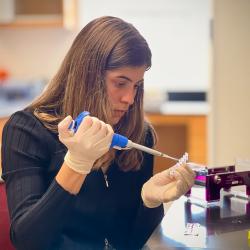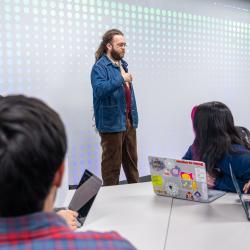Six Science Terps Received CMNS Alumni Network Summer Awards
The awards enabled students to conduct research, attend a scientific conference and work as an intern over the summer.
Every year, the College of Computer, Mathematical, and Natural Sciences Alumni Network offers summer awards to help undergraduates defray costs related to conducting research, attending conferences or interning.
Read below how this year’s award recipients furthered their professional and career development with funding from the Undergraduate Summer Research, Travel, and Educational Enrichment Awards program.
Rakshita Balaji
Senior neuroscience major Rakshita Balaji spent the summer months conducting research on neural mechanisms behind perceptual learning—looking at how a pattern of breaks can assist with music learning.
Working with Department of Biology Assistant Professor Melissa Caras, Balaji investigates how humans can perceive differences between increasingly similar auditory stimuli. This summer, she studied neuron activity in the auditory cortex of the brain by creating and validating an auditory discrimination task for Mongolian gerbils, whose low-frequency hearing resembles humans’.
“Beyond facilitating musical expertise—such as pinpointing whether an instrument’s pitch is sharp or flat—perceptual learning is important for language acquisition in early development,” Balaji explained. “It can also help users of assistive listening devices sharpen their perception of what they hear.”
Nathan Boyle
Neuroscience and Persian studies dual-degree student Nathan Boyle spent his summer developing an app to help patients with Tourette syndrome at the Johns Hopkins University Center for OCD, Anxiety, & Related Disorders for Children (COACH).
Boyle also conducts independent research using machine learning to characterize tic and urge psychophysiology in Tourette syndrome. He continues to refine his research questions to consider new approaches.
“The award has enabled me to commit most of my time this summer to research while being able to afford tuition next semester,” Boyle said. “The significant progress I have made in my research projects this summer meaningfully improves my chance of being admitted to M.D./Ph.D. programs when I apply.”
Yiting Lin
This summer, junior biological sciences major Yiting Lin is studying bladder cancer—the fourth most common cancer in men and the eighth most common cancer in women. As an intern at the University of Maryland School of Medicine, Lin studies the changes in bladder cancer cell metabolism in response to five drug treatment conditions.
Cancer cells have enhanced metabolic activity, and their metabolism functions differently than normal cells. By studying cancer cell metabolic pathways at UMSOM, Lin and her team have gained greater insights into how aggressive the cancer is, how cancer cells respond to drug treatments and the effectiveness of those treatments in inhibiting cancer cell proliferation.
“My research project has given us greater insight into how the metabolic responses of bladder cancer cells differ after treatment with various therapeutic agents,” Lin explained. “My data also indicated that drug combination therapy increased efficacy in metabolic inhibition and reduction of cancer cell viability.”
Alyssa Mazzone
Junior computer science and immersive media design major Alyssa Mazzone spent her summer developing a user interface for cybersecurity company CACI.
The user interface she developed allows users to schedule and visualize signals that can jam drones that may pose a security threat.
“At first, I was intimidated being one of the only females hired as a software development intern,” Mazzone said. “However, I took this as an opportunity to rise above and work extra hard in order to prove myself, gaining respect amongst others in the workplace.”
Saad Pirzada
Biological sciences senior Saad Pirzada also interned at UMSOM this summer, where he worked with OB-GYN patients transferred to the intensive care unit and also studied the clinical factors that determine whether patients are good candidates for life support.
“The Summer Award has been tremendously helpful in defraying costs, since I have been traveling to and from Baltimore since June 2021 as a volunteer research associate,” Pirzada said. “As a low-income, first-generation college student, this award made all the difference.”
Pirzada said these projects have sharpened his research analysis skills and deepened his passion for improving the care of vulnerable patients.
Sruthi Srinivasan
This summer, senior biological sciences major Sruthi Srinivasan continued her research looking at transposable elements—mobile units of DNA—in the Marsilea vestita genome, a fern plant that has recently been fully sequenced by Cell Biology and Molecular Genetics Associate Professor Stephen Mount and collaborator Fay-Wei Li.
Because fern genomes have not been extensively analyzed, researchers anticipate examining the Marsilea vestita genome will help shed light on the structure, function and evolution of genomic elements that characterize the fern family. After working on characterizing an element of the genome and writing a paper on that data, Srinivasan’s Summer Award paid for her to attend and present a poster at the Population, Evolutionary, and Quantitative Genetics Conference.
“I am extremely thankful to have had the chance to submit a poster for my research and attend the conference online,” Srinivasan said. “Seeing how various research projects I've worked on throughout my undergraduate career use methods that other people in the genetics community express in their own projects made me feel more connected to research and excited to see what my future career holds.”
Are you interested in supporting undergraduate students in their professional development and research activities? Consider donating to the CMNS Science Alumni Network Current Use Fund for Student Support.







